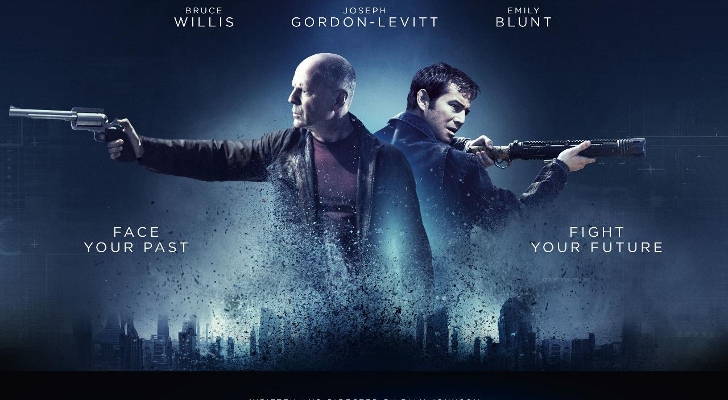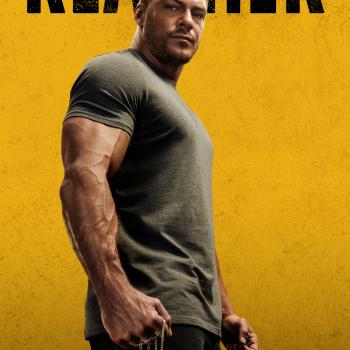Review of Looper, Directed by Rian Johnson
By COYLE NEAL
If you’ve seen Timecop, The Butterfly Effect, or any of the Terminator or Back to the Future films, you’ll have a rough idea of the premise behind Looper. In this particular spin on the time travel tale, the mob sends people it needs “disappeared” into the past, where they are executed and disposed of by “Loopers.” When the mob decides to retire a Looper, they “close the loop” by sending the Looper himself through as an older man to be executed by his younger self. The young Looper is then free to spend the rest of his life in relative affluence (until he’s caught by the mob and sent back in time). What happens when one Looper is bent on changing the future? A decent Bruce Willis/Joseph Gordon-Levitt movie, that’s what.
As with most decent sci-fi flicks, there are a number of interesting themes running through the movie. One that I found particularly interesting is that the characters repeatedly declare their identity to be wrapped up in their property. That is, they are unique and authentic individuals and truly human because of what they own—an interesting twist on John Locke’s labor theory of property, which argues that we give material from the natural world value when we mix it with our labor and make it our own. To Locke, a plot of land has no intrinsic value until we have built a house or planted a crop on it. A piece of wood has no value until we shape it into something. We, according to Locke, give identity to material goods. (See John Locke’s Second Treatise, Chapter V.)
Looper turns that idea around, and argues that rather than us giving value to property, property gives value to us. Characters define themselves by what they own, be it wealth (in the form of gold and silver), transportation (cars and motorcycles), or even just a gun (and not necessarily a very good gun at that). By contrast, those who own nothing are mere vagrants, barely human and held in utter contempt by those who have property. This future world is full of such vagrants—destitute people who have to beg or steal while living on the streets. In one scene, we see a vagrant snatch another man’s suitcase (which is open, and clearly only has a couple of items of clothing in it) and flee, only to be shot in the back a few steps later. So great is the desire to have something—and so be a real person—that even a mostly-empty suitcase is worth being killed over.
The result of this way of defining ourselves is emptiness and selfishness. Despite their property, no one is truly satisfied in this world. People have to supplement their goods with sex and drugs just to get through the day, and still are neither happy nor virtuous. The life of a Looper is a life of murder, betrayal, and greed, all in the name of material goods that bring nothing of transcendent worth to their owner.
As an alternative to this lifestyle, the film holds up the ideal of unconditional love. (I can’t be too explicit here without giving away some of the good stuff of the movie, so you’ll have to just trust me on this.) The people in the movie with the best lives are those who live not for themselves and their property, but for others. The truly good life is the life that involves unconditionally loving even those who are not worthy of that love—who may never return it. This is the life of true virtue and happiness, the life worthwhile and worth dying to preserve.
With this, we’ve arrived at something that every Christian can understand. Creation—property—is not to define us. It is rather man who is charged with the care of the created order. (Genesis 1:28-30) We should be putting the stamp of ourselves on creation, not letting creation stamp itself upon us. But if we do not find our identity in creation, where do we find it? How do we know who we are? The Bible teaches that we should find our identity in two places: in our original creation in the image of God (Genesis 1:26-27) and, if we are believers, in our re-creation through the Gospel (2 Corinthians 5:17). Especially in the second of these sources of our identity, we see the value of being defined not by material goods, but by the unconditional love of another. When God laid down his life in our place on the cross, he forgave our sins and restored the relationship with and life in him that we had lost through our rebellion. He loves us unconditionally and in doing so gives value and meaning to lives that once were defined by emptiness, selfishness, and sin. Only through this unconditional love can we hope to find any joy or peace in the world, and live the full and authentic life of true virtue and happiness that property can never deliver.
Coyle Neal lives in Washington, DC and spends a small part of every day honing his vampire-killing skills.












